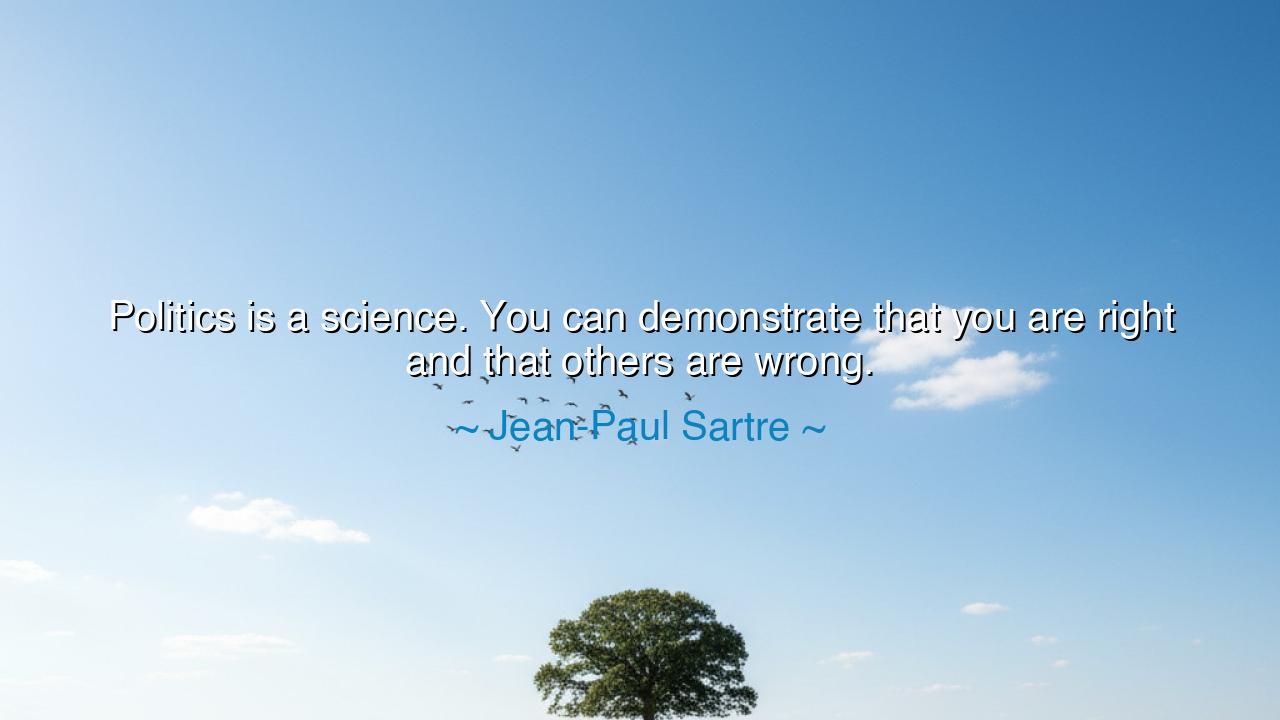
Politics is a science. You can demonstrate that you are right and
Politics is a science. You can demonstrate that you are right and that others are wrong.






Listen closely, O children of wisdom, and take heed of the words of the philosopher Jean-Paul Sartre, who said: "Politics is a science. You can demonstrate that you are right and that others are wrong." In these words, Sartre presents a profound view of politics, one that may seem cold or rational to some, but which is deeply entwined with the very nature of human conflict and debate. Politics, for Sartre, is not just an art of persuasion or governance, but a science, a domain where reason and evidence are used to demonstrate the rightness of one’s position while showing the flaws or errors in the positions of others. Through this lens, politics becomes a struggle for truth—where the objective is not simply to sway others, but to present irrefutable proof of one’s perspective.
In the ancient world, the roots of politics lay deeply in the philosophical musings of men like Plato and Aristotle. Plato, in his Republic, envisioned the philosopher-king as the ultimate ruler, one whose decisions were based not on personal gain, but on the pursuit of truth and the greater good. Aristotle, too, saw politics as an endeavor that required reason, logic, and scientific analysis of human behavior, structures, and systems. Politics, for these ancients, was not simply a matter of power or manipulation, but of understanding the principles that governed human society. Sartre, with his existentialist lens, similarly sees politics as an arena where rationality and the truth of the individual should shape the decisions that affect the collective. Yet, Sartre’s view goes deeper, emphasizing that politics is not just about creating harmony or consolidating power, but about demonstrating truth in the face of opposing views.
Sartre's assertion that politics is a science brings to light the battle for reason in the political realm. In a world where competing ideologies often clash, science—which seeks objectivity and evidence-based reasoning—becomes a powerful tool for those who wish to prove their vision of society. Consider the great political struggles of history, where the rightful cause has often been determined by the clarity and truth of the arguments put forth. The American Revolution, for instance, was not merely a rebellion against British rule, but a struggle for justice and reason, where the founders of the United States demonstrated the moral and intellectual superiority of their cause through careful argumentation and principled debate. The Declaration of Independence is itself an exercise in demonstrating the inherent rights of individuals, using the science of reasoning to reject the authority of a distant monarchy.
In the 19th century, Karl Marx offered a new perspective on political science. Through his works, he sought to demonstrate that the capitalist system was fundamentally flawed and unjust, using historical and economic analysis to show how the system exploited the working class. His vision of Marxism was grounded in a deep belief in scientific socialism—the idea that political systems, like the natural world, could be studied, analyzed, and understood through reason and evidence. For Marx, politics was not a realm of mere emotional appeal or moral argument, but a science based on the laws of history and the struggle of classes. This belief in the power of reason and analysis to uncover the truth is a direct echo of Sartre’s claim that politics, at its heart, is a science—a field in which one can demonstrate the superiority of one’s position over others through logic and evidence.
The lesson, O children of time, is this: politics, at its highest form, is not just a struggle for power, but for truth. It is not enough to simply hold a position or sway the masses; to be truly political, one must be able to demonstrate the validity of one’s views through reason, evidence, and principled argument. In a world where opinions are many and perspectives are diverse, the true political mind is one that seeks to understand the complexities of human society and present rational solutions to its problems. Politics, like science, requires the courage to stand by your truth, to argue with clarity, and to unveil the facts that support your cause. Just as scientific discoveries are made through rigorous testing and evidence, so too is the political struggle won by those who can provide the most compelling arguments for their vision of the world.
In your own lives, remember that politics, in its purest sense, is not about following the loudest voice or the most popular opinion. It is about the pursuit of truth—the truth of the human condition, of justice, and of reason. Whether you are engaged in formal politics, or simply in the daily negotiations of life, approach your conversations with the spirit of a scientist, seeking to understand, to question, and to demonstrate the truth of your beliefs. Do not accept shallow arguments or ideologies; instead, seek to uncover the deeper truths that will guide you in shaping a more just and thoughtful society. In all things, be courageous enough to stand for what is right, and wise enough to demonstrate your reasoning.
Rise, O heirs of wisdom, and take this lesson to heart: politics is not mere rhetoric, nor is it the art of manipulation. At its finest, politics is the science of reason, the pursuit of truth, and the fight for a better world. Let your arguments be grounded in evidence, your decisions shaped by reason, and your actions aligned with the principles of justice and human dignity. Through this, you will demonstrate not just that you are right, but that you understand why, and that in doing so, you bring the world closer to the truth it seeks.






AAdministratorAdministrator
Welcome, honored guests. Please leave a comment, we will respond soon